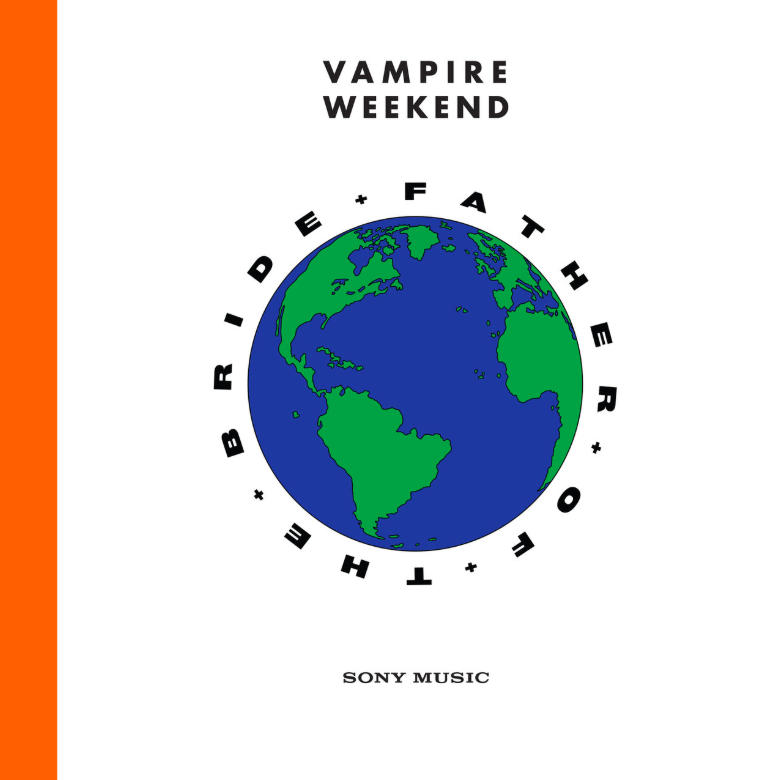Has there ever been a better time to appreciate Vampire Weekend? This is a band, of course, whose modus operandi has long been to pierce the bubble of moneyed privilege surrounding places like Cambridge and Manhattan so we can all have a look inside. Consider what may be the best, if not biggest, news story of the year: the revelation that wealthy families on both coasts had paid six and seven figure sums in an elaborate scheme to get their children accepted into some of the most prestigious universities in the country—or, at the very least, UCLA. In 2007, Ezra Koenig’s pained yelps about escaping Cape Cod because “Hyannis Port is a ghetto” may have come off as bratty and myopic. But now, a decade-plus later, with the CEO of Hyannis Port Capital arrested for trying to buy his children enrollment at USC, Stanford and Harvard, it can only be read as prescient.
So it’s funny then that the current moment also finds the band beginning a new chapter, with Koenig creating the first Vampire Weekend album without his principal collaborator Rostam Batmanglij. Further, the band long ago emerged victorious from the war they were once forced to engage in—when they were perceived to be the representation of white privilege instead of astute examiners of it, when Koenig’s sketch of a young rich girl who grew up wearing Louis Vuitton but who now listens to reggaeton on the campus lawn was seen as celebration instead of deflation. Conversations surrounding class, culture, and college may still animate the lives of anyone who uses social media or watches the news, but Vampire Weekend, if anyone, can look on as veterans of a battlefield that seems to produce new victims by the day.
As such, their new album Father of the Bride is more personal and inward looking than any of their previous three, though Koenig seems comfortable creating with the shadows of these old controversies still looming. When the band recently released a double-single with songs called “This Life” and “Unbearably White” it represented a quiet but canny bait-and-switch; it’s the former song whose chorus hangs on a couplet about privilege—“I’ve been cheating through this life and all its suffering / Oh Christ, am I good for nothing?”—and the latter that meditates quietly on the interior lives of a couple in the process of pulling apart. The result of this refocusing of perspective is not the band’s best album—on balance, it’s probably their worst—but a nonetheless rewarding and meaty development in the story of a band who have improbably emerged as lifers.
When Batmanglij left the band, he did so in part because he had begun dipping his toes into the waters of pop music and wanted to see what else may be living beneath. (Though as a blanket rule you can never blame a gay man for wanting to work more with Charli XCX and Carly Rae Jepsen.) Vampire Weekend were popular, but they weren’t really pop. Despite consecutive No. 1 albums, they never hit the pop charts, instead carving out a niche on rock radio as a light, playful, and erudite indie antidote to the otherwise explosive, tightly coiled angst surrounding them on the airwaves. Koenig, though, may have been following the same muse as his ex-bandmate, just down different paths. Father of the Bride was created primarily by Koenig and pop-indie kingmaker Ariel Rechtshaid, but with help from producers like DJ Dahi (Drake, Kendrick Lamar), Bloodpop (Justin Bieber, John Legend), and Ludwig Göransson (Childish Gambino). What we’re left with is a stylistically stimulating album that further fleshes and mellows out the band’s peppy, preppy sound, shading it towards country music and acoustic stoner-rock—the sort of thing you might hear at, say, an impromptu Earth Day concert in a park.
Fittingly, when at its best, Father of the Bride breathes like no other Vampire Weekend before it. Koenig’s voice, an acquired taste no doubt but the dominant one delivered by his band, is surrounded most often by the air around it—a distinct sense of space that gives what otherwise could be a fidgety and quizzical album a feeling of relaxation. This production works best when paired with songs in which Koenig examines turmoil between two people with a measured calm, finding a place of comfort. Opener “Hold You Now” begins the album with Koenig and Danielle Haim playing two doomed lovers in what should be as anxious a situation as one could conjure: Haim is a bride on her wedding day and her husband isn’t Koenig’s character, even though the two are conversing in a bedroom somewhere. “I can’t carry you forever,” Koenig sings, “but I can hold you now,” a finger-plucked guitar enveloping them in a shimmer. “Spring Snow,” which appears 16 tracks later, finds the narrator in a similar situation, with a late-season snowstorm keeping two lovers together just as they were set to disconnect. “The end’s been delayed, you’re here in my arms,” Koenig sings, “So what should I say?” The answer, it turns out, is nothing, a meandering wordless chorus offering the listener a fleeting sort of serenity.
Rechtshaid is a chameleonic superproducer without a sonic fingerprint, and you get the sense from Father of the Bride that his role was not to guide Koenig in any direction as much as provide him ample room to explore what a Vampire Weekend song in a post-Rostam world might even be. On the one hand, everything sounds spectacular; on the other, the album does contain some of the worst ideas the band has ever put to tape, well-intentioned though they may have been. “How Long?” is a song about Los Angeles falling into the ocean that also sports a few sonic tributes to the city’s rap music, including a piano line that echoes DJ Mustard and a spring-loaded drum sound reminiscent of DJ Quik. Koenig is clever, but he ain’t that clever. Elsewhere, the other two duets with Danielle Haim don’t fulfill the promise of the opener—“Married in a Gold Rush” is overstuffed and weighed down by allegory, while “We Belong Together” (a Batmanglij production) is a nice little ditty with dodgy lyrics that unfortunately just makes you want to listen to one of the best songs of all-time. Closer “Jerusalem, New York, Berlin” retains the album’s sense of tranquility, but is fatally underwritten, with Koenig ending its short chorus by reciting the song’s title as if he’s looking at a list of bullet points.
When Batmanglij left Vampire Weekend, he said that he felt like it was time for his songwriting and production to stand on its own. Consequently, Koenig, along with a new constellation of collaborators, has proved that his does, too. Father of the Bride may be initially difficult to wrap one’s head around—either by accident or not, many of its best songs were released as singles—but over time it becomes a world that is nice to slip into, even dominated as it is by thoughts of environmental destruction, religion, and heartbreak. Koenig is a survivor, and with the rest of the country still mired in the muck that once used to drip from his band, he is looking forward. Perhaps the album’s most surprising song is “Stranger,” which is sung directly to his girlfriend Rashida Jones. “Things are gonna stay strange,” Koenig belts with a lilt in his voice, trumpets blurting behind him. “I remember life as a stranger, but things change.”





